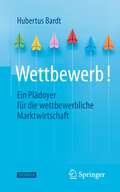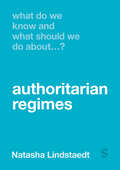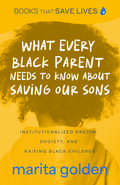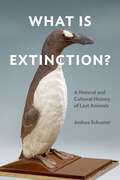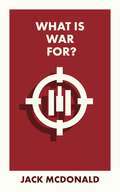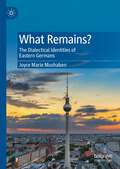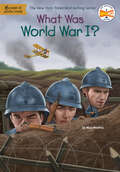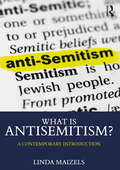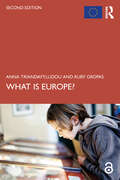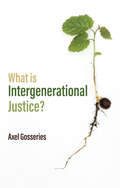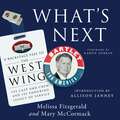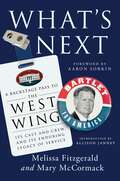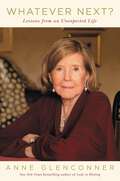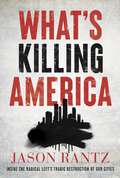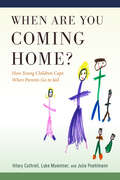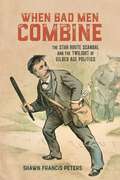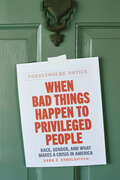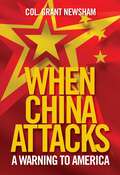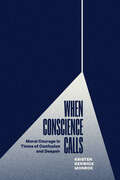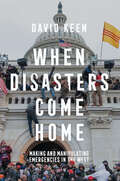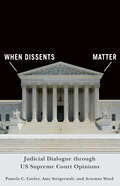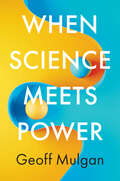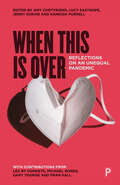- Table View
- List View
Wettbewerb!: Ein Plädoyer für die wettbewerbliche Marktwirtschaft
by Hubertus BardtWettbewerb ist eine zentrale Grundlage der Sozialen Marktwirtschaft in Deutschland. Aber er ist eine ungeliebte und vielfach abgelehnte Basis unseres Wohlstands. Druck, Konkurrenz und Anpassungszwang machen Wettbewerb unangenehm und manchmal schmerzhaft. Vom Globalisierungskritiker bis zum Monopolunternehmer hat er viele Gegner. Dabei bringt Wettbewerb an vielen Stellen Nutzen: Mehr Effizienz, mehr Innovationen, hohe Kundenorientierung und effizienter Umgang mit Ressourcen gehören dazu.Dieses Buch ist ein Plädoyer für Wettbewerb, der durch das Recht geschützt werden muss und zugleich klare Spielregeln und unparteiische Schiedsrichter braucht, damit das Wohlstandsversprechen der Sozialen Marktwirtschaft eingelöst werden kann. Im der aufkommenden Systemkonkurrenz mit autokratischen und staatskapitalistischen Systemen ist der Wettbewerb eine große Stärke der freiheitlichen und marktwirtschaftlichen Demokratien.
What Do We Know and What Should We Do About Authoritarian Regimes? (What Do We Know and What Should We Do About:)
by Natasha LindstaedtAt least 70% of the world’s population now lives under an autocracy. There are more openly authoritarian states than ever, democratic regimes are ‘backsliding’ into autocracy, and authoritarian values and practices are increasingly normalized. Regimes in China and Russia are as prominent and urgent as ever, but authoritarianism is spreading across the globe. Why is this happening? What can we do about it? This book is a concise and compelling exploration of the increasing number and influence of authoritarian regimes. It explains the realities of recent trends to ‘autocratisation’, the tools these regimes use, what we can do to resist, and why we might even allow ourselves a degree of optimism. Professor Natasha Lindstaedt works at the Department of Government at the University of Essex. Written by leading social scientists, the What Do We Know and What Should We Do About...? series offers concise, up-to-date overviews of issues often oversimplified, misrepresented or misunderstood and shows you how to enact change. "Short, sharp and compelling." - Alex Preston, The Observer "If you want to learn a lot about what matters most, in as short a time as possible, this is the series for you."- Danny Dorling, 1971 Professor of Geography, University of Oxford
What Every Black Parent Needs to Know About Saving Our Sons: Institutionalized Racism, Society, and Raising Black Children (Books That Save Lives)
by Marita GoldenEmpower Your Sons Against Institutionalized Racism“One of the most important pieces of literature for Black parents.”—MJ Fievre, author of Raising Confident Black KidsA powerful guide to navigate the challenges of raising families in turbulent times. In What Every Black Parent Needs to Know about Saving Our Sons, gain profound advice on how to protect and nurture Black teen boys.Essential knowledge, practical guidance. With intimate storytelling of her own son’s story and in-depth research against the chilling backdrop of racially motivated brutality, acclaimed author Marita Golden reveals alarming statistics and systemic issues affecting children of color—and remedies.A powerful and timely resource, What Every Black Parent Needs to Know about Saving Our Sons addresses pressing issues of today with new material and updated resources. Wisdom from psychologists, writers, and young Black men initiates meaningful discussions and delves into the complexities of Black parenting. Tackle topics such as generational trauma, being Black in white spaces, institutionalized racism, gun violence and how to not get shot, supporting mental health for black men, and other problems Black kids face. Embark on a transformative journey towards raising confident, successful, and resilient kids.Inside, find:Realities faced by Black families and the importance of teaching kids about racismGuidance to navigate, discuss, and explore the impact of fearing the black bodyConversations and strategies to keep our kids safe and growing up greatIf you liked The Light We Carry, Decoding Boys, Three Mothers, or American Carnage, you’ll love What Every Black Parent Needs to Know about Saving Our Sons.
What Is Cybersecurity For? (What Is It For?)
by Tim StevensHow will protecting our digital infrastructure shape our future? Cybersecurity is one of the key practical and political challenges of our time. It is at the heart of how modern societies survive and thrive, yet public understanding is still rudimentary: media portrayals of hoodie-wearing hackers accessing the Pentagon don’t convey its complexity or significance to contemporary life. This book addresses this gap, showing that the political dimension is as important as the technological one. It accessibly explains the complexities of global information systems, the challenges of providing security to users, societies, states and the international system, and the multitude of competing players and ambitions in this arena. Making the case for understanding it not only as a technical project, but as a crucial political one that links competing visions of what cybersecurity is for, it tackles the ultimate question: how can we do it better?
What Is Extinction?: A Natural and Cultural History of Last Animals
by Joshua SchusterWINNER, 25th ANNUAL SUSANNE M. GLASSCOCK BOOK PRIZELife on Earth is facing a mass extinction event of our own making. Human activity is changing the biology and the meaning of extinction. What Is Extinction? examines several key moments that have come to define the terms of extinction over the past two centuries, exploring instances of animal and human finitude and the cultural forms used to document and interpret these events.Offering a critical theory for the critically endangered, Joshua Schuster proposes that different discourses of limits and lastness appear in specific extinction events over time as a response to changing attitudes toward species frailty. Understanding these extinction events also involves examining what happens when the conceptual and cultural forms used to account for species finitude are pressed to their limits as well. Schuster provides close readings of several case studies of extinction that bring together environmental humanities and multispecies methods with media-specific analyses at the terminus of life.What Is Extinction? delves into the development of last animal photography, the anthropological and psychoanalytic fascination with human origins and ends, the invention of new literary genres of last fictions, the rise of new extreme biopolitics in the Third Reich that attempted to change the meaning of extinction, and the current pursuit of de-extinction technologies. Schuster offers timely interpretations of how definitions and visions of extinction have changed in the past and continue to change in the present.
What Is War For?
by Jack McDonaldHow does armed conflict shape global politics? And, critically, can it ever be regulated, a necessary first step to achieving a more peaceful world? This book examines the factors that define and shape war in the contemporary world, and how changes to technology and society are transforming warfare. Focusing on efforts to regulate and eliminate war, it provides a guide to the complex problems it poses now – and threatens in the future.
What Remains?: The Dialectical Identities of Eastern Germans
by Joyce Marie MushabenThis book tells the story of the German Democratic Republic from “the inside out,” using the lens of generational change to deconstruct an intriguing array of social identities that had little to do with the “official GDR” version authoritarian rulers regularly sought to impose on their citizens. The author compares the “identities” of five societal subgroups (GDR writers and intellectuals; pastors and dissidents; women; youth; and working-class men), exploring the policies defining their lives and status before/during/after the 1989 Wende, as well as the diverging “exit, voice and loyalty” dilemmas encountered by each. The “dialectical” components treated in this work center on the extent to which eastern identities were lost, found and reconfigured across three generations, from 1949 to 1989, from 1990 to 2005, then up to 2020. It explores how the existence of a separate East German state and the socialization processes imposed on each subculture has not only complicated the search for national unity since 1990 but also -- perhaps more controversially—invoked new challenges directly related to ongoing East-West structural disparities since unification and the treatment of eastern Germans by often more privileged western Germans.
What Was World War I? (What Was?)
by Nico Medina Who HQThis compelling addition to the What Was? series covers what was supposed to be &“the war to end all wars&” but tragically wasn't.In 1914, the assassination of an Austrian archduke set off a disastrous four-year-long conflict involving dozens of countries with battles taking place in all parts of the world. World War I was the first to use planes and tanks as well as deadly gases that left soldiers blinded or &“shell shocked&” (a condition now called Post Traumatic Stress Syndrome). There were battles that lasted for months with opposing troops fighting from rat-infested trenches, battles that often ended in a hollow victory with only a small area of land retaken. The author of many successful Who HQ titles Nico Medina gives young readers a clear and compelling account of this long and tragic event, a war that left over 20 million dead and was the lead-up to World War II barely twenty years later.
What is Antisemitism?: A Contemporary Introduction (What is this thing called Religion?)
by Linda MaizelsIn October 2018, a white supremacist murdered eleven Jewish worshipers and wounded six others at the Tree of Life Synagogue in Pittsburgh, Pennsylvania, the deadliest attack on Jews ever perpetrated in the United States. The gunman’s motivation to kill Jews stemmed from his belief that Jews were committing "genocide" against white Americans. Although his animosity was motivated by a racial conception of Jews, the attack took place in a house of worship, illustrating the complex and interlocking web of anti-Jewish hatred based on race, ethnicity, nationality, religion, economic issues, and conspiracy theory that is commonly referred to as "antisemitism." What is Antisemitism? provides a detailed overview of this complex topic. It offers a history of anti-Jewish animosity from antiquity to the present; a discussion of the difficulties of defining antisemitism - arguably one of the most contentious issues in the contemporary discourse on the subject – and three case studies illustrating the diverse and wide-ranging nature of the phenomenon in the present-day, including examples from the political far right, the political hard left, and radical Islamism. With suggestions for further reading, and a chronological structure, this volume is an accessible and essential student textbook.
What is Europe?
by Anna Triandafyllidou Ruby GropasThis authoritative yet accessible introduction to understanding Europe today moves beyond accounts of European integration to provide a wide-ranging and nuanced study of contemporary Europe and its historical development. This fully updated edition adds material on recent developments, such as Brexit and the migrant and Eurozone crises. The concept of Europe is instilled with a plethora of social, cultural, economic, and political meanings. Throughout history, and still today, scholars writing on Europe, and politicians involved in national or European politics, often disagree on the geographic limits of this space and the defining elements of Europe. Europe is, therefore, first and foremost a concept that takes different shapes and meanings depending on the realm of life on which it is applied and on the historical period under investigation. At a given point in time, depending on the perspective we adopt and the situation in which we find ourselves, Europe may represent very different things. Thus, we should better talk about ‘Europes’ in plural. What is Europe? explores these evolving conceptions of Europe from antiquity to the present. This book is all the more timely as Europe responds to the Russian invasion of Ukraine and Britain’s departure from the European Union, financial slump, refugee emergencies, and the COVID-19 pandemic. This book offers a fully updated introduction to European studies from an interdisciplinary perspective. It is a crucial companion to any undergraduate or graduate course on Europe and the European Union. The Open Access version of this book, available at www.taylorfrancis.com, has been made available under a Creative Commons Attribution-Non Commercial-No Derivatives 4.0 license.
What is Intergenerational Justice?
by Axel GosseriesCan people alive now have duties to future generations, the unborn millions? If so, what do we owe them? What does “justice” mean in an intergenerational context, both between people who will coexist at some point, and between generations that will never overlap? In this book, Axel Gosseries provides a forensic examination of these issues, comparing and analyzing various views about what we owe our successors. He discusses links between justice and sustainability, and looks at the implications of the fact that our successors’ preferences are heavily influenced by what we will actually leave them and by the education they receive. He also points to how these theoretical considerations apply to real-life issues, ranging from pension reform and Brexit to biodiversity and the climate crisis. He ends by outlining how intergenerational considerations may translate into institutional design. Anyone grappling with the dilemmas of our obligations to the future, from students and scholars to policy makers and active citizens, will find this an invaluable theoretical and practical guide to this moral and political minefield.
What's Next: A Backstage Pass to The West Wing, Its Cast and Crew, and Its Enduring Legacy of Service
by Mary McCormack Melissa Fitzgerald"This is the book The West Wing deserves." Allison Janney"A joy and a MUST READ for all the Wingnuts out there!" Brad WhitfordA behind-the-scenes look into the creation and legacy of The West Wing as told by cast members Melissa Fitzgerald and Mary McCormack, with compelling insights from cast and crew exploring what made the show what it was and how its impassioned commitment to service has made the series and relationships behind it endure. Includes an exclusive foreword by showrunner Aaron Sorkin and introduction by cast member Allison Janney.Step back inside the world of President Jed Bartlet's Oval Office with Fitzgerald and McCormack as they reunite the West Wing cast and crew in a lively and colourful "backstage pass" to the timeless series. This intimate, in-depth reflection reveals how The West Wing was conceived, and spotlights the army of people it took to produce it, the lifelong friendships it forged, and the service it inspired.From cast member origin stories to the collective cathartic farewell on the show's final night of filming, What's Next will delight readers with on-set and off-camera anecdotes that even West Wing super fans have never heard. Meanwhile, a deeper analysis of the show's legacy through American culture, service, government, and civic life underscores how the series envisaged an American politics of decency and honour, creating an aspirational White House beyond the bounds of fictional television. What's Next revisits beloved episodes with fresh, untold commentary; compiles poignant and hilarious stories from the show's production; highlights initiatives supported by the cast, crew, and creators; and makes a powerful case for competent, empathetic leadership, hope, and optimism for whatever lies ahead."What's Next is the highest level of access you can get to The West Wing without a background check." Josh Malina"What's Next is the book we all need right now." Dulé Hill"Any West Wing fan will adore this book, as will anyone who admires brilliant television and all that it takes to make it. Run and buy What's Next for all the West Wingers in your life!" Janel Moloney
What's Next: A Backstage Pass to The West Wing, Its Cast and Crew, and Its Enduring Legacy of Service
by Mary McCormack Melissa Fitzgerald"This is the book The West Wing deserves." Allison Janney"A joy and a MUST READ for all the Wingnuts out there!" Brad WhitfordA behind-the-scenes look into the creation and legacy of The West Wing as told by cast members Melissa Fitzgerald and Mary McCormack, with compelling insights from cast and crew exploring what made the show what it was and how its impassioned commitment to service has made the series and relationships behind it endure. Includes an exclusive foreword by showrunner Aaron Sorkin and introduction by cast member Allison Janney.Step back inside the world of President Jed Bartlet's Oval Office with Fitzgerald and McCormack as they reunite the West Wing cast and crew in a lively and colourful "backstage pass" to the timeless series. This intimate, in-depth reflection reveals how The West Wing was conceived, and spotlights the army of people it took to produce it, the lifelong friendships it forged, and the service it inspired.From cast member origin stories to the collective cathartic farewell on the show's final night of filming, What's Next will delight readers with on-set and off-camera anecdotes that even West Wing super fans have never heard. Meanwhile, a deeper analysis of the show's legacy through American culture, service, government, and civic life underscores how the series envisaged an American politics of decency and honour, creating an aspirational White House beyond the bounds of fictional television. What's Next revisits beloved episodes with fresh, untold commentary; compiles poignant and hilarious stories from the show's production; highlights initiatives supported by the cast, crew, and creators; and makes a powerful case for competent, empathetic leadership, hope, and optimism for whatever lies ahead."What's Next is the highest level of access you can get to The West Wing without a background check." Josh Malina"What's Next is the book we all need right now." Dulé Hill"Any West Wing fan will adore this book, as will anyone who admires brilliant television and all that it takes to make it. Run and buy What's Next for all the West Wingers in your life!" Janel Moloney
Whatever Next?: Lessons from an Unexpected Life
by Anne Glenconner**Instant Sunday Times Bestseller** Bracing honesty, rare insight, and more revelations: the New York Times bestselling author of Lady in Waiting shares everything she's learned from her extraordinary and unexpected life.Lady in Waiting brought us royal magic, beguiling insight, and jaw-dropping stories from life inside Anne Glenconner&’s privileged circle, which though golden didn't always glitter. As she revealed in her memoir, it has been one of stark contrasts—from growing up in the splendor of Holkham Hall to living in a tent in the jungle of Mustique, from traveling the world with Princess Margaret to coping with her wildly unpredictable husband Lord Glenconner. She has also survived the tragic loss of two of her sons and nursed a third son back from a coma. Now in her ninth decade and at her happiest, she's keen to share everything her unexpected life has taught her—the wise, the hilarious, the poignant, and the illuminating. As a wife, she became a master in the art of keeping the peace, knowing when to pick her battles, when she needed help—and when to take a lover. As a hostess, she acquired great practical skills in throwing marvelous parties and looking after magnificent homes, and, as a lady in waiting, became well versed in diplomacy and etiquette. It was as a mother she learnt the toughest lessons of all, and through them the value of friendship, family, and laughter to get her through the worst moments in life, as well as celebrate the best of them. Whatever Next? is a treasury of hard-won wisdom, and richly entertaining proof that staying open to every new adventure sets an inspiring example for us all.
What’s Killing America: Inside the Radical Left's Tragic Destruction of Our Cities
by Jason RantzA stunning book about how America&’s biggest cities are being destroyed by progressive policies and woke Democrats. Many Americans have no idea how badly our largest, Democrat-run cities have deteriorated. We've been complacent for far too long, assuming that the craziest elements of the radical Left would stay confined to the East and West coasts. But crime, drug addiction, homelessness, left-wing school indoctrination, so-called inclusive housing policies, and outrageous taxes don&’t stay within the big city limits of places like Los Angeles, Chicago, Portland, New York, Seattle, and San Francisco. The effects of ideologically driven left-wing policies always spread, which should alarm Americans regardless of their political leanings. Jason Rantz is a prominent radio host, a trusted journalist, and a frequent Fox News guest unafraid to go directly into the action. He&’s grown a national following by breaking news the mainstream media won&’t, covering the consequences of destructive leftist policies wherever they occur. He was right there for the chaos in his hometown of Seattle when liberal anarchists declared an autonomous, police-free &“CHOP Zone.&” He infiltrates the Antifa marches and knows firsthand how those radicals operate. This is the shocking story of what he&’s learned. Employing on-the-ground reporting and fact-based analysis, Rantz zooms out to conduct a fascinating detailed, data-driven study of how these liberal policies result in chaos, misery, and (too often) bloodshed. He skillfully recounts the tragic events with a narrative reporter's eye for detail to tell the true story of what's happening in America's cities.
When Are You Coming Home?: How Young Children Cope When Parents Go to Jail (Critical Issues in Crime and Society)
by Hilary Cuthrell Luke Muentner Julie PoehlmannAs the United States approaches its 50th year of mass incarceration, more children than ever before have experienced the incarceration of a parent. The vast majority of incarceration occurs in locally operated jails and disproportionately impacts families of color, those experiencing poverty, and rural households. However, we are only beginning to understand the various ways in which children cope with the incarceration of a parent – particularly the coping of young children who are most at risk for the adversity and also the most detrimentally impacted. When Are You Coming Home? helps answer questions about how young ones are faring when a parent is incarcerated in jail. Situated within a resilience model of development, the book presents findings related to children’s stress, family relationships, health, home environments, and visit experiences through the eyes of the children and families. This humanizing, social justice-oriented approach discusses the paramount need to support children and their families before, during, and after a parent’s incarceration while the country simultaneously grapples with strategies of reform and decarceration.
When Bad Men Combine: The Star Route Scandal and the Twilight of Gilded Age Politics
by Professor Shawn Francis PetersThe Star Route scandal captured the nation’s attention for more than a decade, with newspapers throughout the United States characterizing it as an unprecedented case of Gilded Age graft. Shawn Francis Peters’s When Bad Men Combine provides a glimpse into this uniquely tumultuous period marked by brazen greed and duplicity. In the first book to offer a full recounting of the Star Route maelstrom, which roiled American politics during the 1870s and 1880s, Peters reveals how postal service corruption resulted in a remarkable legal case that featured jury bribery and document theft. When Bad Men Combine follows the saga to its culmination as two sensational criminal trials presented evidence implicating some of the most prominent men in America and, perhaps, led to the assassination of President James Garfield.
When Bad Things Happen to Privileged People: Race, Gender, and What Makes a Crisis in America (Emersion: Emergent Village Resources For Communities Of Faith Ser.)
by Dara Z. StrolovitchA deep and thought-provoking examination of crisis politics and their implications for power and marginalization in the United States. From the climate crisis to the opioid crisis to the Coronavirus crisis, the language of crisis is everywhere around us and ubiquitous in contemporary American politics and policymaking. But for every problem that political actors describe as a crisis, there are myriad other equally serious ones that are not described in this way. Why has the term crisis been associated with some problems but not others? What has crisis come to mean, and what work does it do? In When Bad Things Happen to Privileged People, Dara Z. Strolovitch brings a critical eye to the taken-for-granted political vernacular of crisis. Using systematic analyses to trace the evolution of the use of the term crisis by both political elites and outsiders, Strolovitch unpacks the idea of “crisis” in contemporary politics and demonstrates that crisis is itself an operation of politics. She shows that racial justice activists innovated the language of crisis in an effort to transform racism from something understood as natural and intractable and to cast it instead as a policy problem that could be remedied. Dominant political actors later seized on the language of crisis to compel the use of state power, but often in ways that compounded rather than alleviated inequality and injustice. In this eye-opening and important book, Strolovitch demonstrates that understanding crisis politics is key to understanding the politics of racial, gender, and class inequalities in the early twenty-first century.
When China Attacks: A Warning to America
by Grant NewshamWhen China Attacks is a fire bell in the night—a warning about a war that we are already losing. It offers a frightening, and well-founded, blow-by-blow account of what might happen next.China poses an existential threat to America, warns a veteran intelligence officer, and the window for an effective response is closing fast. Col. Grant Newsham, a former reserve head of intelligence for Marine Forces Pacific, delivers a blow-by-blow account of how the threat has developed, from the growing skill and belligerence of the Chinese military to gray-zone campaigns to hollow out America&’s will to resist. These efforts that have now reached fruition. You can see the war damage in Baltimore, Erie, Buffalo, and countless other communities across the United States. With decades of experience in Asia, including as a U.S. Marine, a diplomat, and an executive with Morgan Stanley and Motorola in Japan, Col. Newsham brings together the military, political, economic and social to provide insights into how far along we already are, and what needs to be done. Now. The question is not whether the Chinese will attack. They already have. It is trying to kill our economy, our institutions, our way of life, our people. It is dominant in the world economy. It is a master of intellectual property theft. It shows strategic genius at cornering essential markets. It has been staggeringly successful in buying influence among American elites. It is killing us with Fentanyl. And its military buildup is astonishing. So far, China has been waging a mostly covert war on the United States and its allies. But, emboldened by American weakness and perceived decline, the war could soon explode into the open. The flashpoint will be Taiwan—but the war will extend over the entire Pacific Theater and beyond. The results—as Col. Newsham paints in stark detail—will be devastating. America risks a humiliating retreat, with almost unimaginable costs to our economy and security. Will America fight back before the cold war that Communist China is waging against America and its allies goes hot? The conflict is coming. We&’re not ready. China is already attacking America. Is American defeat inevitable? No, but we must change course immediately. And to do that, we must wake up and heed the sobering message of When China Attacks.
When Conscience Calls: Moral Courage in Times of Confusion and Despair
by Kristen Renwick MonroeWhat is moral courage? Why is it important and what drives it? An argument for why we should care about moral courage and how it shapes the world around us. War, totalitarianism, pandemics, and political repression are among the many challenges and crises that force us to consider what humane people can do when the world falls apart. When tolerance disappears, truth becomes rare, and civilized discourse is a distant ideal, why do certain individuals find the courage to speak out when most do not? When Conscience Calls offers powerful portraits of ordinary people performing extraordinary acts—be it confronting presidents and racist mobs or simply caring for and protecting the vulnerable. Uniting these portraits is the idea that moral courage stems not from choice but from one’s identity. Ultimately, Kristen Renwick Monroe argues bravery derives from who we are, our core values, and our capacity to believe we must change the world. When Conscience Calls is a rich examination of why some citizens embrace anger, bitterness, and fearmongering while others seek common ground, fight against dogma, and stand up to hate.
When Conscience Calls: Moral Courage in Times of Confusion and Despair
by Kristen Renwick MonroeWhat is moral courage? Why is it important and what drives it? An argument for why we should care about moral courage and how it shapes the world around us.War, totalitarianism, pandemics, and political repression are among the many challenges and crises that force us to consider what humane people can do when the world falls apart. When tolerance disappears, truth becomes rare, and civilized discourse is a distant ideal, why do certain individuals find the courage to speak out when most do not?When Conscience Calls offers powerful portraits of ordinary people performing extraordinary acts—be it confronting presidents and racist mobs or simply caring for and protecting the vulnerable. Uniting these portraits is the idea that moral courage stems not from choice but from one’s identity. Ultimately, Kristen Renwick Monroe argues bravery derives from who we are, our core values, and our capacity to believe we must change the world. When Conscience Calls is a rich examination of why some citizens embrace anger, bitterness, and fearmongering while others seek common ground, fight against dogma, and stand up to hate.
When Disasters Come Home: Making and Manipulating Emergencies In The West
by David KeenIn the late twentieth century, disasters seemed like distant happenings in countries far away from the prosperous West. But today they are ‘coming home’ with a vengeance. From global warming to migration crises, from assaults on democracy to Covid-19 and the fall-out of war in Ukraine – the West is in the grip of multiple, overlapping crises that keep its populations in a state of perpetual fear and distraction. Disasters should be awakening us to the need to reform our disaster-producing system. Yet instead, as David Keen shows in this disturbing and original book, they are routinely being exploited for political as well as economic gain. A number of crises, whether slow-burning or sudden, are not only reinforcing each other but also bolstering the toxic politics that helped to generate them. One key problem here is the use of emergencies to vilify those who are trying to relieve them or to highlight their root causes. Unless these voices and alternative perspectives find a way to break through, we risk being locked into a system of emergency politics that is self-reinforcing rather than self-correcting – and that routinely manufactures its own legitimacy.
When Dissents Matter: Judicial Dialogue through US Supreme Court Opinions (Constitutionalism and Democracy)
by Artemus Ward Pamela C. Corley Amy SteigerwaltThe ability of US Supreme Court justices to dissent from the majority, to formally register and explain their belief that a case has been wrongly decided, represents a time-honored tradition of perhaps the most august American institution. Yet the impact of these dissents, which allow justices to engage in a dialogue over law and policy, has seldom, if ever, been the focus of dedicated study. Analyzing the influence of past dissents on later Supreme Court majority opinions, this book presents the first comprehensive study of the effects of dissenting opinions and illuminates which types of dissents successfully influence legal and policy debates, which ones fail to make a difference, and why.Drawing on the private papers of the justices and original data, this book demonstrates that court majorities engage with dissents posing a particular threat to their opinions, and that they can be persuaded by thoughtful and careful dissenting arguments.
When Science Meets Power
by Geoff MulganScience and politics have collaborated throughout human history, and science is repeatedly invoked today in political debates, from pandemic management to climate change. But the relationship between the two is muddled and muddied. Leading policy analyst Geoff Mulgan here calls attention to the growing frictions caused by the expanding authority of science, which sometimes helps politics but often challenges it. He dissects the complex history of states’ use of science for conquest, glory and economic growth and shows the challenges of governing risk – from nuclear weapons to genetic modification, artificial intelligence to synthetic biology. He shows why the governance of science has become one of the biggest challenges of the twenty-first century, ever more prominent in daily politics and policy. Whereas science is ordered around what we know and what is, politics engages what we feel and what matters. How can we reconcile the two, so that crucial decisions are both well informed and legitimate? The book proposes new ways to organize democracy and government, both within nations and at a global scale, to better shape science and technology so that we can reap more of the benefits and fewer of the harms.
When This Is Over: Reflections on an Unequal Pandemic
by Gary Younge Sue Black Amy Cortvriend, Lucy Easthope, Jenny EdkinsThe COVID-19 pandemic had a profound and persistent impact – a tragic loss of life, changes to established patterns of life and social inequalities laid bare. It brought out the good in many and the worst in others, and raised questions around what is truly important in our lives. In this book, academics, activists and artists come together to remember, and to reflect on, the pandemic. What lessons should we learn? How can things be different when this is over? Sensitive to inequalities of gender, race and class, the book highlights the experience of marginalised and minority groups, and the unjust and uneven spread of violence, deprivation and death. It combines academic analysis with personal testimonies, poetry and images from contributors including Sue Black, Led By Donkeys, Lara-Rose Iredale, Michael Rosen and Gary Younge. This truly inclusive commemorative overview honours the experience of a global disaster lived up close, and suggests the steps needed to ensure we do better next time.
